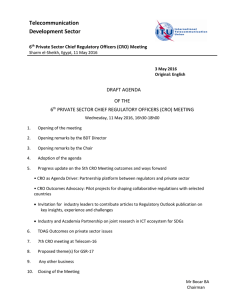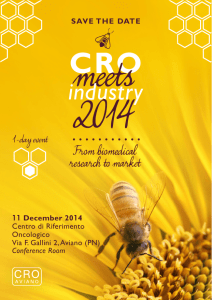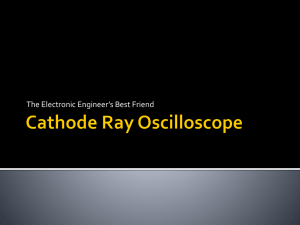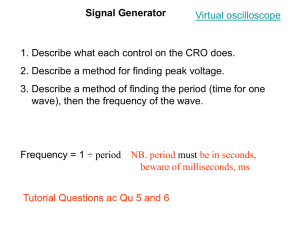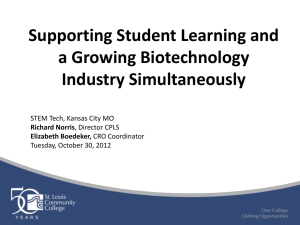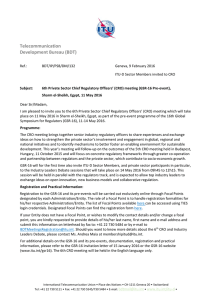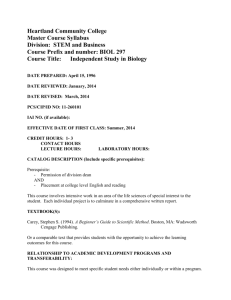Telecommunication Development Sector 4
advertisement
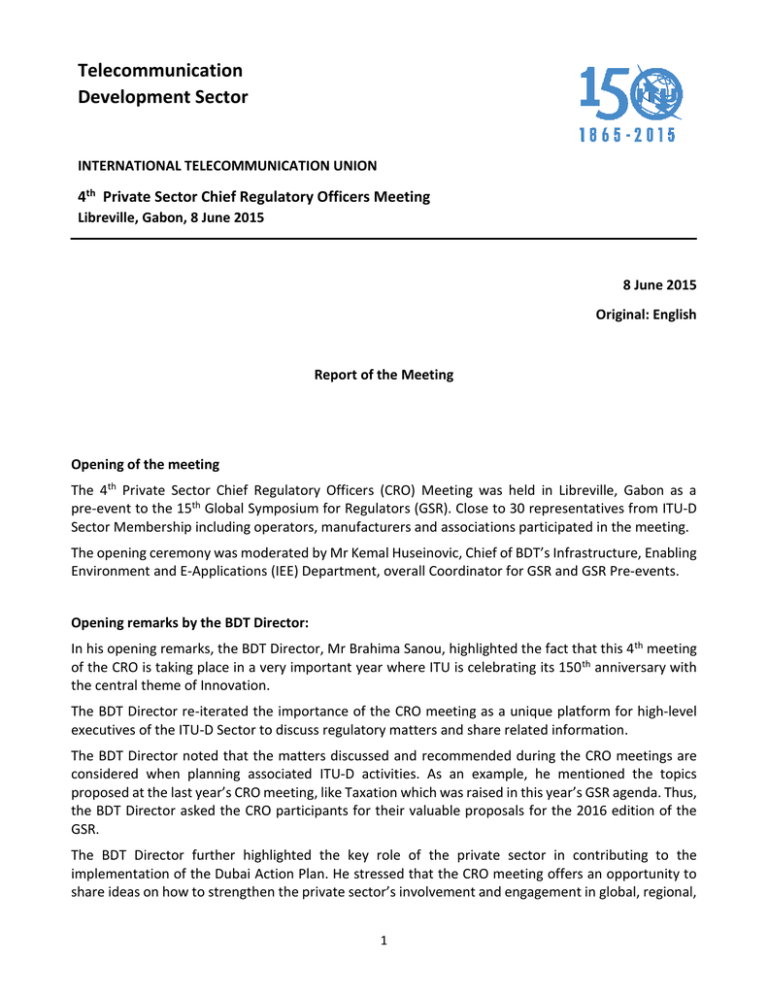
Telecommunication Development Sector INTERNATIONAL TELECOMMUNICATION UNION 4th Private Sector Chief Regulatory Officers Meeting Libreville, Gabon, 8 June 2015 8 June 2015 Original: English Report of the Meeting Opening of the meeting The 4th Private Sector Chief Regulatory Officers (CRO) Meeting was held in Libreville, Gabon as a pre-event to the 15th Global Symposium for Regulators (GSR). Close to 30 representatives from ITU-D Sector Membership including operators, manufacturers and associations participated in the meeting. The opening ceremony was moderated by Mr Kemal Huseinovic, Chief of BDT’s Infrastructure, Enabling Environment and E-Applications (IEE) Department, overall Coordinator for GSR and GSR Pre-events. Opening remarks by the BDT Director: In his opening remarks, the BDT Director, Mr Brahima Sanou, highlighted the fact that this 4th meeting of the CRO is taking place in a very important year where ITU is celebrating its 150 th anniversary with the central theme of Innovation. The BDT Director re-iterated the importance of the CRO meeting as a unique platform for high-level executives of the ITU-D Sector to discuss regulatory matters and share related information. The BDT Director noted that the matters discussed and recommended during the CRO meetings are considered when planning associated ITU-D activities. As an example, he mentioned the topics proposed at the last year’s CRO meeting, like Taxation which was raised in this year’s GSR agenda. Thus, the BDT Director asked the CRO participants for their valuable proposals for the 2016 edition of the GSR. The BDT Director further highlighted the key role of the private sector in contributing to the implementation of the Dubai Action Plan. He stressed that the CRO meeting offers an opportunity to share ideas on how to strengthen the private sector’s involvement and engagement in global, regional, 1 and national initiatives and projects. “CRO is a room for collaboration where, despite your differences, you can come together on issues such as regulatory, policy and market.” “Make this framework what you want it to be. We want to do things that make sense for you. The members make the framework useful. Be the change you would like to see”, he continued. The Director added that: “There is no development without business, and there is no business without development”, highlighting the important link between business, development and the BDT. The BDT Director thanked Dr. Robert Pepper, from Cisco System, as previous Chair of the CRO, and Ms Gabrielle Gauthey formerly with Alcatel-Lucent. Ms Gauthey had initially accepted to take on the chairmanship of the CRO, however since then, she has taken on new professional responsibilities as Caisse des Dépôts Director of Local Development and Investment since 9 February 2015, and Member of the Caisse des Dépôts Management Committees. Following consultations with the ITU-D membership, the BDT Director proposed Mr Bocar Ba, Chief Executive Officer of Samena Telecommunications Council as new CRO Chair. The CRO participants were in unanimous agreement in approving the new Chair. Opening remarks by the CRO Chair The new CRO Chair, Mr Bocar Ba, made a presentation enclosing among others a mission statement, CRO proposed objectives and mechanisms for consideration and discussion by the meeting: CRO Chairman’s mission statement: “To contribute to the enhancement of CRO as a platform to identify regulatory areas of global industry interest, effectively: addressing which issues could foster even greater co-operation between regulators and the private sector, and how cross-sector efforts could impact socio-economic growth in the world to an even greater extent.” CRO proposed objectives: 1. Secure confidence of the private sector and encourage representation from all segments, thus encouraging greater private sector participation in the CRO meetings, effective the 4th meeting and onward. 2. Increase effectiveness and efficiency of CRO to meet the dialogue and problem-solving needs of the ICT industry. 3. Serve as a tool to better define and reach consensus on contentious industry issues and emerging challenges. 4. Promote the growth of ICT and digitization, and encourage investment in-flow through improved regulatory frameworks and private sector understanding and co-operation with regulators. 5. Facilitate the fulfillment of ITU-D’s mission. 6. Gain an industry-wide standing as an active medium of intellectual support and participation that achieves tangible output in support of the promotion of telecommunications and ICTs around the globe. 2 CRO proposed mechanisms: aiming at achieving the proposed objectives: #1 Plan to meet more regularly as mechanism to be more impactful and achieve better effectiveness: e.g. at ITU Telecom World and GSMA Mobile World Congress, in addition to the CRO annual meeting held in the framework the GSR. #2 Foster more dialogues with the aim of reaching consensus among the CRO participants and educate regulators and policy makers. Aim to align the CRO agenda with that of regulators and policy makers to be better heard by them through GSR. The participants applauded the proposals. They agreed on the necessity to meet more regularly to enable reaching the objectives. The participant also highlighted the importance for detailed follow up on action items agreed during the 2013 and 2014 CRO meetings (held in Poland and in Bahrain respectively). This included the establishment of a mailing list, and new tools for conducting discussions in between meeting. The new dedicated mailing list itudcro@lists.itu.int can be subscribed to using TIES (subscribe here). The meeting also proposed to provide information on ITU-D Sector Members participating in the CRO on the ITU website as well as use the ITU newsletters to feature stories by CRO members. Thus, it was hoped that the new mechanisms will be put in place to allow continuous conversations beyond the physical meetings while keeping in mind that there should be no duplication of effort with other existing mechanisms. Additionally, the chairman suggested to publish special articles in the ITU periodical magazine to diffuse the CRO meeting outcomes over 193 member countries. Issues discussed Three following proposed topics of the agenda were then discussed by the participants: - - Enabling Environment: to achieve modern, timely and measurable regulatory policies and tools to enhance innovation in investment strategies Market Access and infrastructure: to promote private sector investment and innovation and fostering the growth of mobile broadband for an accelerated digital impact on socio-economic development Market-specific policies: to look at cutting edge regulatory issues such as IoT/M2M that can collectively promote economically viable models for global development Next steps and possible areas of focus for the future Out of three topics proposed, two were retained for subsequent edits by a small team of CRO participants present at the meeting. The agreed output and draft statement was to be shared by the participants during the GSR meeting when the opportunities arose. During the discussions in response to the presentation by the Chair and the items in the draft agenda, the following issues were noted by the participants: New discussions should be encouraged and promoted to allow policy makers to translate technology into policy. 3 Many position papers, studies, and information are available to facilitate discussion, however they are currently not shared efficiently. CRO is an advocacy board for BDT on private sector regulatory issues, other mechanisms are more appropriate to solve other contentious issues, such as C-band at the WRC. Participants fell these meeting are high level and not working meetings like that of the CRO. The CRO was to be thought of as an extension of existing mechanisms. Very little information is shared on best practices where regulators and private sector have come together to solve needs. A case study from Senegal was shared to highlight an example of how the private sector and the regulators have worked together. Thus, CRO needs to find ways to better promote lessons learned and best practice sharing. Participants expressed tremendous difficulty in reaching regulator individually, thus CRO and GSR remain a great forums to reach out. Focus discussions on common issues, agree on these and come out with strong messages. Some issues are best handled in other appropriate forums, thus focus should be on what is within the CRO scope. The need to be pragmatic and focus the CRO discussions on what can be delivered and shared. When discussing best practices, there is a need to be clear on what the CRO is trying to achieve. There is a need to have capacity building on highly dynamic aspects of the industry and a need for governments to step in to create demand. One of the issues proposed by the Chair related to market specific policies was rejected as participants felt that the CRO approach should be technology neutral. GSR-16 Agenda issues to raise A small team of the CRO was tasked to re-draft the retained statement from the agenda and shared as appropriate during the remainder of the GSR forum. The finalized draft from this team is included in the annex. CRO discussions have not yet finalize or agree on any specific item to be pushed forward for GSR-16. However, the two issues retained from the draft agenda could serve as the basis for inclusion on a GSR-16 agenda. Since there is a plan to meet again at ITU Telecom World 2015, some of the details could be worked there. Closing of the meeting In his closing remarks, the BDT Director emphasized that the CRO meeting is not a platform to “fight for pieces of a small pie, but to get the pie bigger so that all participant can share a bigger piece”. ITUD is an information broker between governments and private sector members, and as such a common ground can always be found. The BDT Director suggested the CRO could act as an advisory board to BDT, which outcomes could be shared in different ways, such as at the ITU-D Study Groups where the membership share best practices. In addition, BDT can undertake studies on matters that are of particular interest to CRO participants, as appropriate. The Chair thanked all the participants for their productive contributions to the meeting and looks forward to the meeting’s follow-up with the meeting report, the new communication mechanism, a 4 roadmap to address the issues that had been raised, and plans for the next CRO meeting during ITU Telecom World 2015 to be held in October 2015, in Budapest, Hungary. Annex The following outputs were retained and included as output statements of the CRO meeting: Achieving the Optimal Regulatory Environment: given the dynamic, fast changing ICT ecosystem, use mechanisms to adopt relevant, flexible, and measurable policies and tools to enhance both supply and demand-side investment strategies. Promoting Market Access and Infrastructure: foster private sector investment, competition and innovation, which will drive broadband access as a platform for socio-economic development. Bocar BA Chairman ________________ 5
